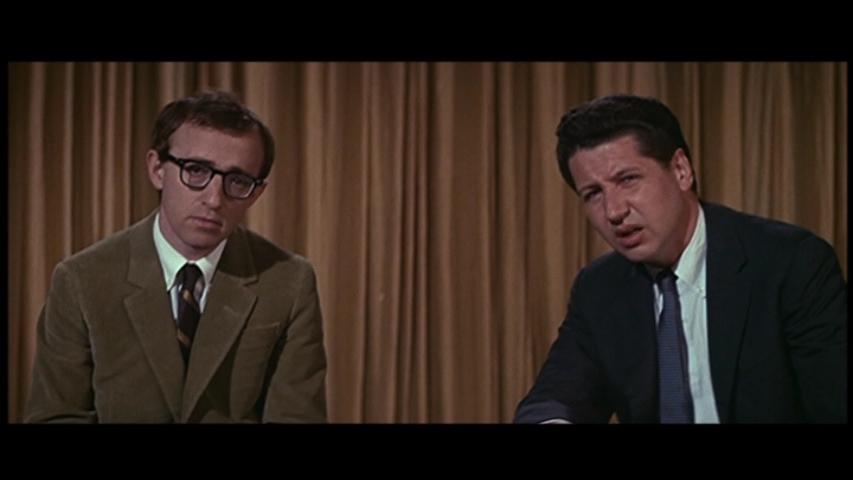Apart from Woody Allen, “the American filmmakers” discussed in this review — which appeared in the March 1976 issue of Monthly Film Bulletin (vol. 43, no. 506) — were apparently Frank Buxton, Len Maxwell, Louise Lasser, Mickey Rose, Julie Bennett, and Bryna Wilson, all credited jointly with Allen for the “script and dubbing” of the 1964 Japanese feature Kizino Kizi that was originally written by Hideo Ando. In recent years, Allen has routinely omitted this film from his filmography, but I persist in finding it one of his funniest. — J.R.
What’s Up, Tiger Lily? [Kizino Kizi]
U.S.A, 1966
[Director: Senkichi Taniguchi]
The wonderful surprise of What’s Up, Tiger Lily? — a modest exploitation exercise which predates Woody Allen’s career as a director, and has inexplicably taken a full decade to reach England — is how much mileage it gets out of what might seem to be a very limited conceit; for sheer laughs alone, it is arguably the most consistently funny film in which Allen has so far taken a hand. Undoubtedly a crucial factor in its success derives from the cheerful fashion in which the American filmmakers foreground their principal strategies. Unlike the dubious practice of an American TV cartoon series which slyly perpetuated the racist stereotypes of Amos ‘n’ Andy by assigning similar voices to animal characters, this 1966 jeu d’esprit avoids the chauvinistic possibilities inherent in a reverse procedure post-dubbing live-action Japanese actors with American voices, many of them evocative of cartoon animals — by beginning with material that is already reeking with American influence, and by taking care to remind audiences of what is being done every step of the way. Indeed, without being too solemn about it, one might propose this movie as an exemplary demonstration of the sort of things that sound and image can do to one another, a principle which figures as the basis for many of the best gags: outside the prison walls, one character gratuitously orders an underling to duplicate his gestures precisely, just before the latter does so; Wing Fat, spreading open his jacket to show he is unarmed, is made to say, “Is this the body of a killer?”; by similar methods, a parcel of cash is transformed into a million dollars’ worth of Monopoly money, the audience is informed à la Peter Pan that an empty gun will be blessed with ammunition only if they “believe”, and the hero is eventually transformed into an airplane, last seen babbling away as he soars into the sky. In a frenzied spirit worthy of the best Tex Avery and Frank Tashlin, the poet laureates of sexual frustration, the hero is asked to “Name three presidents” by one ingénue wrapped in a towel in his hotel room, and is later heard gibbering like a retarded Jerry Lewis as he peers through a keyhole at another. His various bouts of martial arts are punctuated with insults like “Roman cow! Russian snake! Spanish fly!…Spartan dog! Turkish taffy!”, and shortly after he remarks to one villain that ‘Two Wongs don’t make a white”, a demented bartender with the voice of a squashed Peter Lorre is heard breaking into a soulful spiritual. Notwithstanding a few obvious American inserts to accommodate written messages and various intrusions by Allen or The Lovin’ Spoonful, and evident abridgements and reshufflings of the original narrative — including a snatch of reverse-motion which has Wong’s thugs running backward off a boat, recoiling from an imaginary mouse — one mainly experiences the film as an ingenious form of counterpoint whereby the soundtrack offers not merely verbal gags but also virtual set-ups for visual ones, suggesting a collaboration of sorts with (rather than a betrayal of) the energies of the original. And in contrast to the better parts of Bananas, Everything You Always Wanted to Know About Sex, and Sleeper — which tend to inaugurate striking visual and/or narrative notions and then show uncertainty about what to do with them — the spirited pacing of this earlier effort suggests that Allen could well use collaborators as industrious as Hideo Ando and Senkichi Taniguchi in his future movies.
— Monthly Film Bulletin, March 1976




